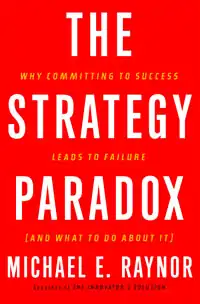The Strategy Paradox
The Strategy Paradox is a business strategy book by author Michael E. Raynor, who is the Distinguished Fellow with Deloitte Research. The Strategy Paradox was published in 2007 by Currency/Doubleday. It was named a top ten book of 2007 by BusinessWeek,[1] and a top five strategy book of 2007 by Strategy+Business.[2]
 Cover of The Strategy Paradox | |
| Author | Michael E. Raynor |
|---|---|
| Country | United States |
| Language | English |
| Genre | Business & Economics Management |
| Publisher | Doubleday |
Publication date | 2007 |
| Pages | 320 pp |
| ISBN | 978-0-385-51622-8 (0-385-51622-3) |
| OCLC | 70778348 |
| 658.4/012 22 | |
| LC Class | HD30.28 .R384 2007 |
Synopsis
The Strategy Paradox, the title and focus of the book sets up a ubiquitous but little-understood tradeoff. The tradeoff is that most strategies are built on specific beliefs about an unpredictable future, but current strategic approaches force leaders to commit to an inflexible strategy regardless of how the future might unfold. It is this commitment to uncertainty that is the cause of "the strategy paradox."
Reviews
- National Post With the right strategy, you can take big risks and win. By John Worsley Simpson, Financial Post
- BusinessWeek Sidstepping Disaster. By Dean Foust
- The Financial Times Take a strategic risk but hedge your bets. By Fergal Byrne
- Boston Globe For CEOs, admitting uncertainty can be the key to success. By Robert Weisman
- Harvard Business Review By Anand P. Raman
References
Further reading
- Raynor, M. E. 2005. Strategic Flexibility: Corporate-level Real Options as a Response to Uncertainty in the Pursuit of Strategic Integration. In Bower, Joseph L., and Clark Gilbert, eds., From Resource Allocation to Strategy, UK, Oxford University Press. Chapter 14.
- Raynor, Michael E. 2002. Strategic Flexibility: Charting a Path Through Uncertainty. Convergence Magazine (South African edition), Vol. 2(4).
- Raynor, Michael E. 2002. Make Peace with Business Uncertainty. Optimize. August.
External links
This article is issued from Wikipedia. The text is licensed under Creative Commons - Attribution - Sharealike. Additional terms may apply for the media files.